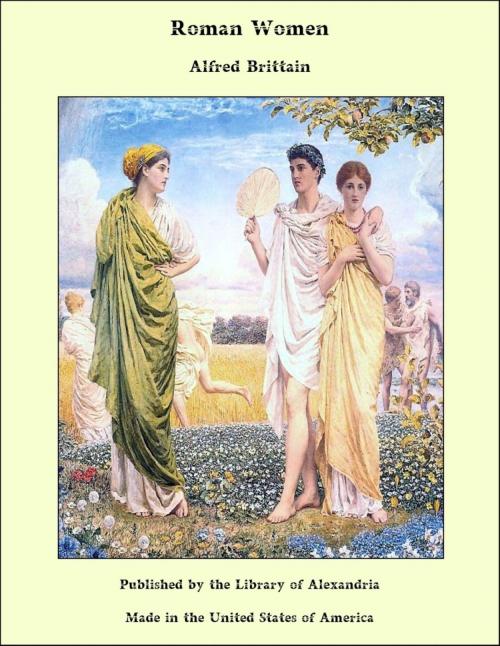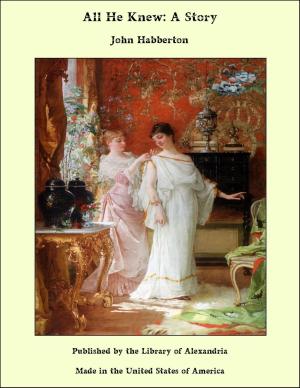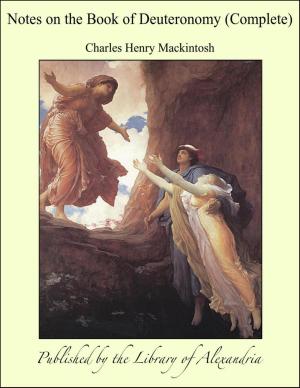| Author: | Alfred Brittain | ISBN: | 9781465576934 |
| Publisher: | Library of Alexandria | Publication: | March 8, 2015 |
| Imprint: | Language: | English |
| Author: | Alfred Brittain |
| ISBN: | 9781465576934 |
| Publisher: | Library of Alexandria |
| Publication: | March 8, 2015 |
| Imprint: | |
| Language: | English |
The conditions which governed the life of woman in the earliest days of Roman history are too far removed from the searchlight of historical investigation for us to essay to indicate them with any degree of fulness and accuracy of detail. While it is true that the ancient writers have bequeathed to us records of historic events from the very founding of their nation, the source of their information is very questionable and its authenticity extremely doubtful. Rome did not cultivate literature until very late in her history; she was too greatly preoccupied in her rôle of conquering the world. At a time when every Greek was acquainted with the noblest poetry produced by his gifted race, Rome had not produced a single writer whose name has been preserved. And if at that time she had possessed any men of letters, it is quite certain that there were few of her citizens who would have been able to read their works. Hence, when the first attempt was made to write her history, the authors depended principally for their material on traditions and legends which, as is the case with all such lore, had gained greatly in marvellousness at the expense of historical value. In addition to these sources, it is probable that during the early centuries annals were kept of the principal happenings in the State. According to Cicero, they were written at the end of each year by the high priest. These records were used by the first historians; and it is likely that the latter were not so greatly restrained, by their literary conscience, from enlarging on the material, as they were tempted, according to the power of their imagination, to present a picture both interesting and satisfactory to the national pride. In many cases, as where the exact words of their characters are reported, the ancient historians evidently deemed that any deficiencies in the matter of proof were abundantly atoned for by the explicitness of the information given. As to the historical value of legends, that is a question upon which modern writers are inclined to disagree. Since the inauguration of the higher criticism, it has been the fashion for extremists entirely to disown any belief in the dramatis personæ of ancient traditions. They claim that the names and the actions thus celebrated usually represent natural forces and historic evolutions; though, to the ordinary student, this would seem to require a remarkable amount of poetic inventiveness on the part of an undeveloped people. Moreover, it is not, perhaps, without reason that the student often looks upon the manner in which modern scholars reject the traditional contributions of the old historians as being a little arbitrary. What traveller has not found his patience sorely tried, while viewing with reverence the reputed site of some heroic or sacred occurrence of far-off days, as he recalled to memory the fact that the latest authorities hold that, while the thing might have taken place a few miles to the east or a short distance to the north, it, for certain erudite but unconvincing reasons, could not possibly have occurred on the spot where it has been located by the continuous belief of centuries?
The conditions which governed the life of woman in the earliest days of Roman history are too far removed from the searchlight of historical investigation for us to essay to indicate them with any degree of fulness and accuracy of detail. While it is true that the ancient writers have bequeathed to us records of historic events from the very founding of their nation, the source of their information is very questionable and its authenticity extremely doubtful. Rome did not cultivate literature until very late in her history; she was too greatly preoccupied in her rôle of conquering the world. At a time when every Greek was acquainted with the noblest poetry produced by his gifted race, Rome had not produced a single writer whose name has been preserved. And if at that time she had possessed any men of letters, it is quite certain that there were few of her citizens who would have been able to read their works. Hence, when the first attempt was made to write her history, the authors depended principally for their material on traditions and legends which, as is the case with all such lore, had gained greatly in marvellousness at the expense of historical value. In addition to these sources, it is probable that during the early centuries annals were kept of the principal happenings in the State. According to Cicero, they were written at the end of each year by the high priest. These records were used by the first historians; and it is likely that the latter were not so greatly restrained, by their literary conscience, from enlarging on the material, as they were tempted, according to the power of their imagination, to present a picture both interesting and satisfactory to the national pride. In many cases, as where the exact words of their characters are reported, the ancient historians evidently deemed that any deficiencies in the matter of proof were abundantly atoned for by the explicitness of the information given. As to the historical value of legends, that is a question upon which modern writers are inclined to disagree. Since the inauguration of the higher criticism, it has been the fashion for extremists entirely to disown any belief in the dramatis personæ of ancient traditions. They claim that the names and the actions thus celebrated usually represent natural forces and historic evolutions; though, to the ordinary student, this would seem to require a remarkable amount of poetic inventiveness on the part of an undeveloped people. Moreover, it is not, perhaps, without reason that the student often looks upon the manner in which modern scholars reject the traditional contributions of the old historians as being a little arbitrary. What traveller has not found his patience sorely tried, while viewing with reverence the reputed site of some heroic or sacred occurrence of far-off days, as he recalled to memory the fact that the latest authorities hold that, while the thing might have taken place a few miles to the east or a short distance to the north, it, for certain erudite but unconvincing reasons, could not possibly have occurred on the spot where it has been located by the continuous belief of centuries?















